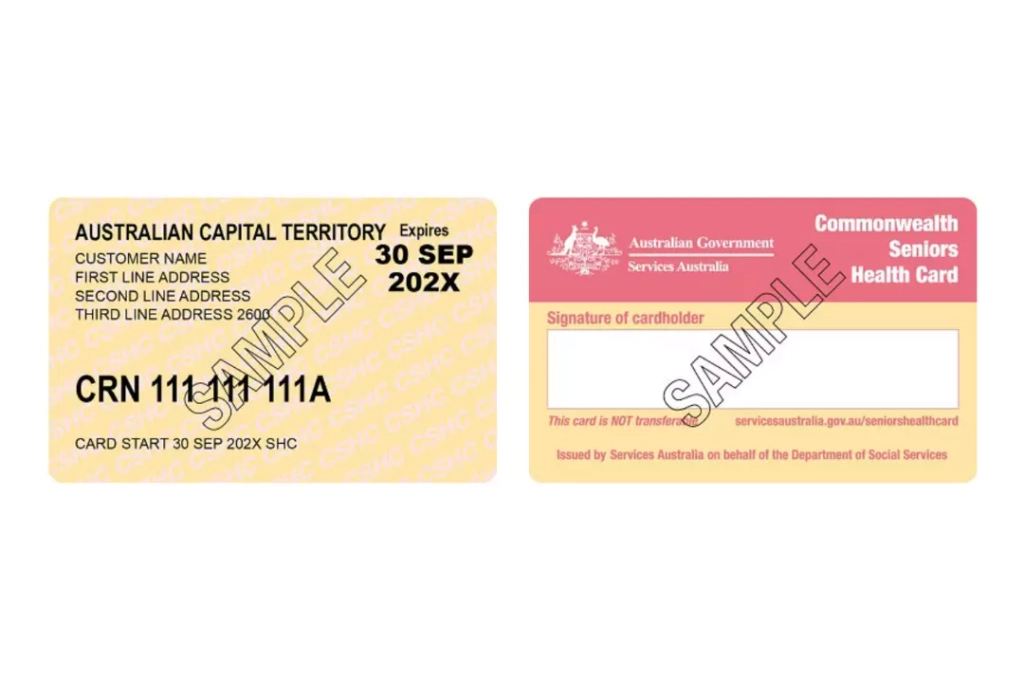Navigating Centrelink Concession Cards for Retirees: A Comprehensive Guide
Table of Contents
ToggleCommonwealth Seniors Health Care card and more
As a retiree in Australia, you may be questioning, “Am I eligible for a Centrelink concession card?” This is a common query, given the array of concession cards available, with some retirees being eligible for more than one. These cards are a gateway to a multitude of concessions including access to lower-cost medicines under the Pharmaceutical Benefits Scheme and subsidised hearing devices. One such notable card is the Commonwealth Seniors Health Care Card (CSHC).
Eligibility Criteria
The type of concession card you or your client might be eligible for is determined by various factors such as age and financial circumstances. Broadly, there are three main types of cards: Pensioner Concession Card (PCC), Low Income Health Care Card (LIHCC), and the Commonwealth Seniors Health Card (CSHC). Each card serves a different segment of the population and has distinct eligibility criteria.
Pensioner Concession Card (PCC)
The PCC is automatically issued to recipients of specific social security payments such as the Age Pension, Carer Payment, Disability Support Pension, and more. Individuals aged 60 or over receiving a JobSeeker Payment or Parenting Payment and those with partial capacity to work are also eligible. The PCC’s eligibility is dependent on accessing a listed social security payment and adhering to residency rules.
Low Income Health Care Card (LIHCC)
This card is for those aged 19 or over, who have income under the stipulated income test limits and meet residency rules. The income considered includes ordinary income, Social Security Pension, foreign pension, income from private trusts, and more. Weekly income thresholds vary depending on your household composition.
Commonwealth Seniors Health Care Card (CSHC)
Focusing on the Commonwealth Seniors Health Care Card, this card caters to individuals above the Age Pension age, who do not qualify for any social security payment. The card has specific income limits and assesses income types such as Adjusted Taxable Income and deemed income from account-based pensions. The card is pertinent for singles with an annual income less than $95,400 and couples with combined income below specific thresholds, depending on their circumstances.
Benefits Comparison
When we compare the benefits, the PCC generally offers the most. All three cards provide discounted rates on medicines listed under the Pharmaceutical Benefits Scheme, bulk billing for doctors’ appointments, and discounted out-of-hospital medical expenses above the concessional threshold of the Medicare Safety Net. However, access to subsidised hearing services program is exclusive to PCC holders. Additional concessions provided by state, territory, and local governments, such as discounted property rates and motor vehicle registration charges, may also be available and vary from state to state.
Renewal Procedures
Understanding the renewal process of these cards is crucial. The PCC and CSHC are automatically renewed after two years, with no application required for renewal. However, LIHCC holders need to apply for renewal annually. Additionally, a person leaving Australia permanently should cancel their concession card immediately upon departure, with different cancellation rules applying for temporary departures.
Portability and Notifications
Regarding portability, recipients departing Australia temporarily might see their cards cancelled after the non-cancellation period, depending on the card type and the duration of the absence. It’s essential to notify Centrelink about departure and return dates to ensure concession entitlement continuity. Recipients holding non-income tested CSHC and PCC will receive these cards indefinitely irrespective of changes in their income but should still notify Centrelink of any significant changes.
Obligations and Notifications
Holders of any concession card have an obligation to inform Centrelink of any change in their personal, business, or financial circumstances within 14 days of the change. Failing to do so might affect the entitlements and lead to potential issues.
Conclusion
Navigating through the various concession cards and understanding the eligibility for the Commonwealth Seniors Health Care Card can seem daunting. However, with a comprehensive understanding of the eligibility criteria, benefits, renewal processes, and obligations, retirees can optimally leverage these cards for a more comfortable and financially secure retirement.
Remember, keeping abreast of any legislative changes and notifying the relevant authorities in a timely manner will ensure that you continue to receive the benefits that you are entitled to. Whether you are a current retiree or planning for your future, understanding the nuances of these concession cards is a step towards a more secure and fulfilling retirement.
Seeking Advice
If you find yourself pondering over your eligibility or the benefits of the Commonwealth Seniors Health Care Card or other concession cards, seeking advice from a financial adviser can offer clarity and guidance tailored to your individual circumstances. Together, we can explore your options and ensure that you are well-positioned to make the most of the available benefits in your retirement years.









